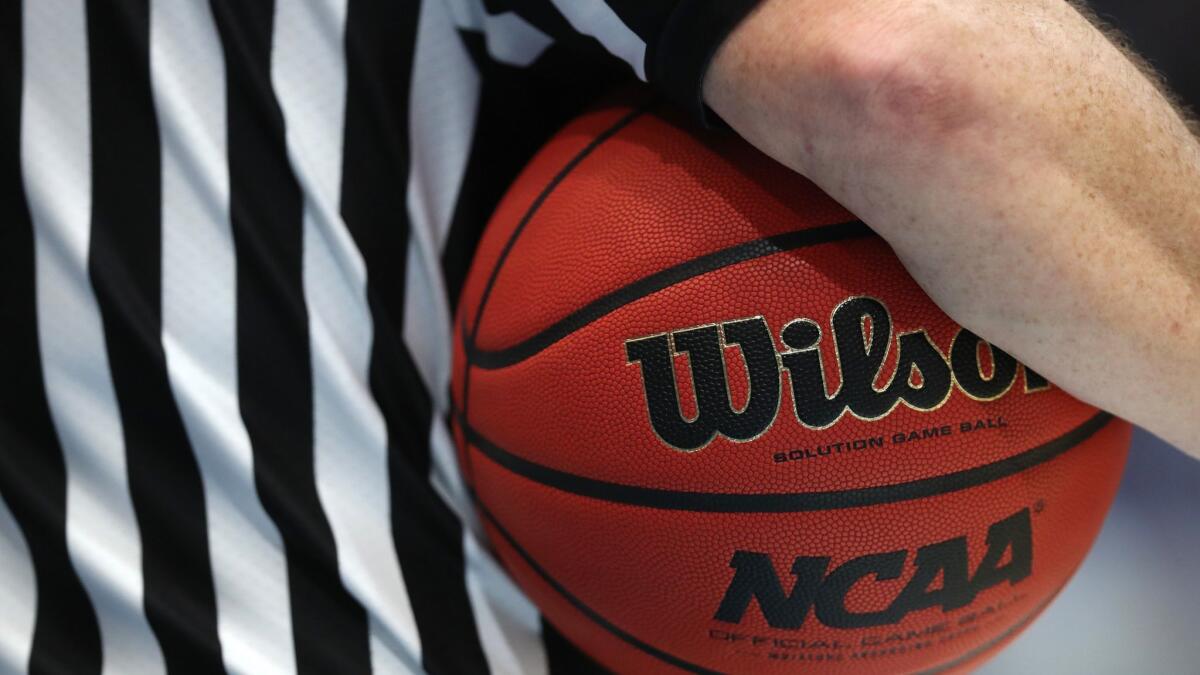Basketball referees are easy scapegoats for the NCAA’s refusal to embrace technology

- Share via
As March Madness begins in earnest, so too will debates and controversies over calls made by the stressed-out referees who officiate the NCAA tournament.
Weighing in on the topic, Hank Nichols, the former head of NCAA basketball officials, once lamented: “Why can’t the coach just say, ‘Yeah, we got a bad call and we lost the game,’ instead of making a big stink out of it? You know, that bad call is part of basketball too.”
The notion that a referee mistake is but another instance of quirky misfortune is an affront to all that sports fans hold sacred.
The promise of fairness is a cornerstone of organized sports. Referees are tasked with ensuring fairness. One would therefore expect the executives in charge of major competitions, such as the zillion-dollar March Madness tournament, to spare no effort when it comes to eradicating referee error.
Mistaken calls are quietly regarded as a cost of doing business, an acceptable price to pay for preserving the flow of the game.
But that is not the case. Although well-funded sports leagues certainly have the technological capability to analyze and evaluate every disputed call, doing so would lengthen games, posing a challenge for TV scheduling and further fragmenting the action. Instead, mistaken calls are quietly regarded as a cost of doing business, an acceptable price to pay for preserving the flow of the game.
Nobody involved dares to say this out loud, of course. Complacency about getting every call right is one of the dirty little secrets of commercial sports, both college and pro. Openly acknowledging that more could be done would simply stir up a hornet’s nest, not least among the horde of gambling interests so dependent on the appearance of fair competition.
So, conveniently, we have a scapegoat — dressed as a zebra, in black-and-white stripes. Dictionary definition of a scapegoat: a person who is blamed for the wrongdoings, mistakes or faults of others, especially for reasons of expediency. This describes perfectly the role that referees play.
Take the NCAA men’s championship game in 2015. Duke was up by five points when a referee made a controversial call in the team’s favor. Meanwhile, fans watching the game on CBS were treated to replay video in which the ball clearly went out of bounds after bouncing off a Duke player, not a Wisconsin player.
Had the refs scrutinized the same camera angles that CBS viewers were repeatedly shown, they undoubtedly would have corrected the call. But who’s got time for that? In the end, Duke won the championship, 68 to 63.
The NCAA places clumsy limitations on video review — governing if, when, how and how often to incorporate the technology in decision-making.
Article 4 of the NCAA’s instant replay rules states that “officials shall not use such available equipment for judgement calls,” including for “goaltending.” Why, exactly?
Similarly, in the NFL, certain types of fouls, such as pass interference, are not deemed reviewable. (Good luck at the Supreme Court, Saints fans.)
Enter the Fray: First takes on the news of the minute »
Major League Baseball continues to eschew the potential advantages of an electronically monitored strike zone to supplement the umpire’s subjective calling of balls and strikes. The sport added video review in 2008, initially permitting only the umpire crew chief to use it — and only for the purposes of assessing the legitimacy of home runs. Since then, a few other scenarios became eligible for video review, including tag plays and trapped balls. But progress has been slow.
Everyone knows there’s a better way, and everyone understands, or should, that there’s a gentlemen’s agreement not to pursue it.
Scapegoats, therefore, serve a purpose. Without them, fans might question the policies that are truly responsible for bad calls, and that could get messy.
Next time you find yourself enraged by a blown call — whether it’s during this year’s NCAA tournament or next year’s Super Bowl — remember the scapegoat and why he is there. With human error to rail against, sports fans can disregard the underlying system error.
Bob Katz is the author of a novel about basketball, “EZ and the Intangibles,” and a nonfiction book about college basketball referees, “The Whistleblower: Rooting for the Ref in the High-Stakes World of College Basketball.”
Follow the Opinion section on Twitter @latimesopinion or Facebook
More to Read
A cure for the common opinion
Get thought-provoking perspectives with our weekly newsletter.
You may occasionally receive promotional content from the Los Angeles Times.









